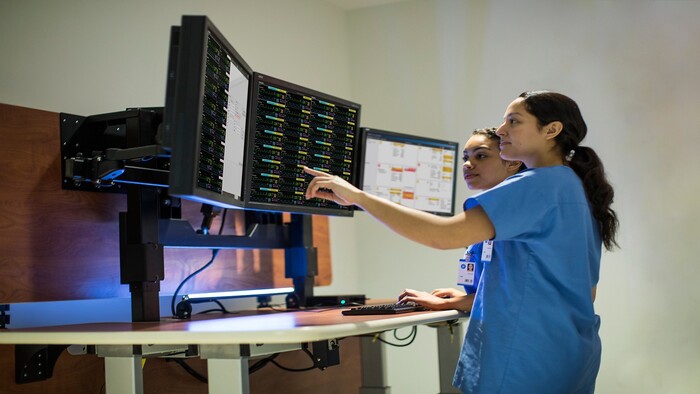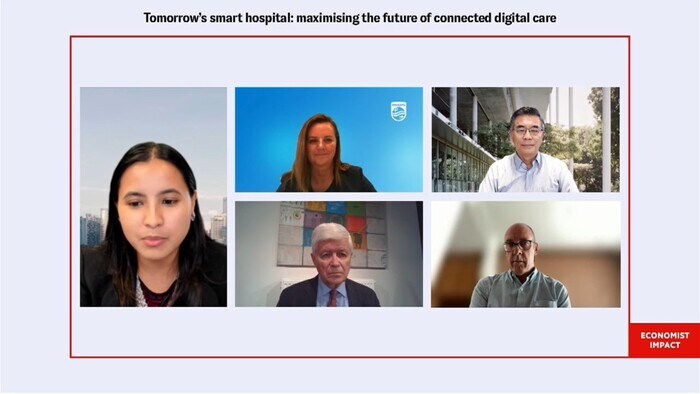
75 years ago, many parts of the world were grappling with infectious diseases, high infant mortality rate and poor access to basic healthcare facilities. 75 years from now – the future of healthcare is going to be equally transformational. Data, AI and predictive analytics will enable better care at homes and hospitals will be able to serve patients at remote locations with ease. As we mark World Health Day today and marvel at the world’s healthcare advancements over the last 75th years, it is important to acknowledge the healthcare challenges still facing the world today. As WHO's Chief Scientist, Dr Soumya Swaminathan highlighted – with more people having access to technology, digital solutions and tools will play an increasingly important role in shaping healthcare landscape in the future. The future of healthcare will be carved by using digital technologies to help our doctors, and healthcare workers make better diagnosis and perform more efficient procedures – thereby reducing healthcare burdens on our strained ecosystems.
30% of the global population are not able to access essential health services. [1] Almost 2 billion people face catastrophic or impoverishing health spending, with significant inequalities affecting those in the most vulnerable settings. [1] Within Asia Pacific, unmet healthcare needs and the strain on healthcare systems for resources are growing more visible as the pandemic recedes. The future of healthcare also needs to rise to the challenge of fostering access through becoming increasingly distributed and interconnected for both in-person and virtual care.
This year’s theme Health For All envisions that all people have good health for a fulfilling life in a peaceful, prosperous, and sustainable world. As we paint the picture of what Health for All would look like in the future, one important question to address is how healthcare systems and hospitals embrace the full possibilities of digital transformation and bring its positive impact to life for healthcare professionals, staff, and patients?
In a panel discussion organized by Economist Impact titled ‘Tomorrow’s Smart Hospital: Maximizing the Future of Connected Digital Care’, Caroline Clarke, Chief Executive Officer and Executive Vice-President, Philips APAC, Stephen MacFeely, Director, Department of Data and Analytics, World Health Organization, Khee Poh Lam, Provost’s Chair Professor of Architecture and the Built Environment, College of Design and Engineering, National University of Singapore, and Paul T Sergeant, Professor Emeritus KU Leuven Faculty of Medicine discussed this important topic with senior representatives from the private, public and civil sectors across health.
World Health Day calls for a renewed commitment by the healthcare industry to achieve Health For All and motivate action to address existing healthcare challenges. Collective efforts and strategic partnerships among healthcare providers, technology innovators, governments, policy makers and other partners will be instrumental in unlocking the power of digital transformation to improve healthcare delivery, achieve better health outcomes, and drive more equitable access to care. At Philips, we aim to be the partner of choice who enable this transformation and achieve newer heights in healthcare,”
Caroline Clarke
Chief Executive Officer and Executive Vice-President, Philips APAC
Healthcare in Asia Pacific Poised for Digital Transformation
Globally, hospitals are pivoting towards data, AI and digital transformation with human-centred design to improve operational and clinical efficiencies and create seamless patient experiences within and beyond hospital walls. The Future of Health Index (FHI) 2022 revealed that extending care delivery beyond existing facilities continues to be a priority of about 25% of APAC healthcare leaders today. This will continue to be a priority for 33% of them three years from now. The study results highlight how APAC is leading the way in utilizing AI and predictive analytics, integrating data, and prioritizing digitalization. Over 80% of APAC healthcare leaders see predictive analytics having a positive impact on health outcomes, patient and staff experience, cost of care and health inequalities. In addition, 82% healthcare leaders shared that AI will become a top investment area within the next three years.
Creating Smart Hospitals with Long-term Vision
Digital transformation will be key to unlocking the potential of technology and smart hospitals will be the entities through which care delivery will be made possible. Going beyond the physical space, tomorrow’s hospital will focus on delivering a set of highly specialized services by using smart technologies to provide the highest-level care, across geographies. Optimizing workflow and resource allocation allow for inefficiencies to be removed and for resources to be freed up for focus on patient care. Using innovative technology and data-driven insights can help future hospitals to drive excellence in diagnosis, outcomes, and efficiency. More importantly, with data and digital technologies, much of the care delivered in the hospital can be brought virtually or physically closer to the patient, at home or in community. Smart hospital will play a more prominent role in managing population health in the future distributed network of care delivered by ambulatory clinics, retail outlets, mobile care solutions, and home-based monitoring that are more accessible for patients.

Source: World Health Organisation - 75 years of improving public health
The Future of Healthcare built with Strategic Partnerships
However, healthcare ecosystem across Asia Pacific is diverse and often at various stages of digital transformation. The realities and challenges of individual hospitals add another layer of complexity. Overcoming data silos continues to remain a hurdle, tackling which will require collaboration from all players, as the panellists highlighted. Existing issues such as, staff satisfaction, inefficient processes, disjointed patient experiences, skill and knowledge gaps prevalent in the healthcare space must be accounted for. Weaving sustainability into the planning phase is also crucial for long-term outcomes. Collaborating, across organization and with other players such as health technology providers, governments, and other partners, on developing a strategic path to integrate portfolio of digital solutions towards building and design a smart hospital will be crucial.
The FHI 2022 report emphasizes the vital role of collaboration in unlocking the true potential of digital transformation that can advance healthcare delivery and bring positive outcomes for patients. As future health systems in APAC become more distributed, strategic partnerships can ensure that through transformation journey, healthcare remains more personal, more accessible, and more dynamic to address the rapidly evolving patient needs.
Technology providers have an important role to play in guiding the healthcare ecosystem across Asia Pacific in their transformation journey, despite the differences in the maturity stages of digital transformation as well as local and cultural realities. Co-creating transformation journeys through long-term strategic partnerships, that span across consultation, designing and building, to financing and acquisition, and with lifetime service support and upgrades, will ensure that hospitals can be ready to leverage technology to transform healthcare delivery and face the challenges of today and tomorrow.













